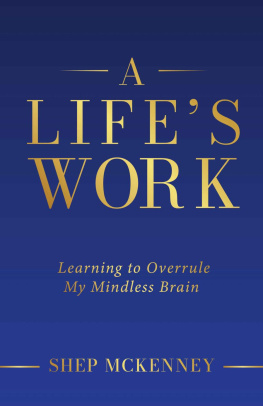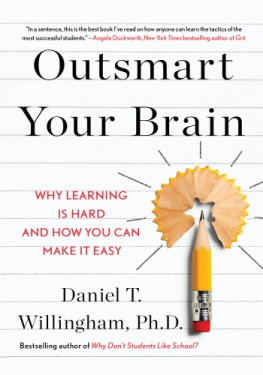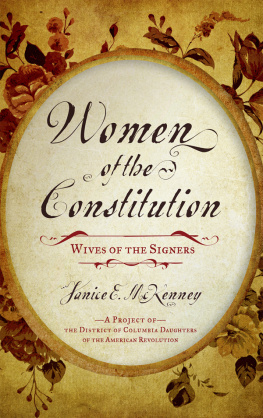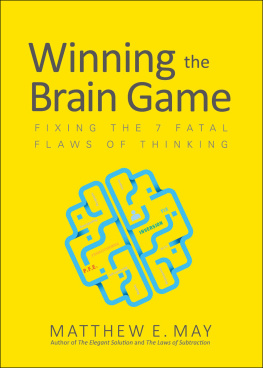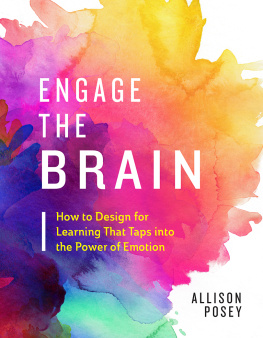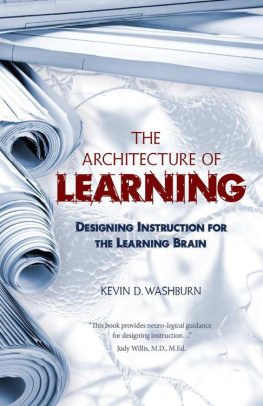Shep McKenney - A Lifes Work: Learning to Overrule My Mindless Brain
Here you can read online Shep McKenney - A Lifes Work: Learning to Overrule My Mindless Brain full text of the book (entire story) in english for free. Download pdf and epub, get meaning, cover and reviews about this ebook. year: 2022, publisher: Transcendent Publishing, genre: Romance novel. Description of the work, (preface) as well as reviews are available. Best literature library LitArk.com created for fans of good reading and offers a wide selection of genres:
Romance novel
Science fiction
Adventure
Detective
Science
History
Home and family
Prose
Art
Politics
Computer
Non-fiction
Religion
Business
Children
Humor
Choose a favorite category and find really read worthwhile books. Enjoy immersion in the world of imagination, feel the emotions of the characters or learn something new for yourself, make an fascinating discovery.
- Book:A Lifes Work: Learning to Overrule My Mindless Brain
- Author:
- Publisher:Transcendent Publishing
- Genre:
- Year:2022
- Rating:4 / 5
- Favourites:Add to favourites
- Your mark:
- 80
- 1
- 2
- 3
- 4
- 5
A Lifes Work: Learning to Overrule My Mindless Brain: summary, description and annotation
We offer to read an annotation, description, summary or preface (depends on what the author of the book "A Lifes Work: Learning to Overrule My Mindless Brain" wrote himself). If you haven't found the necessary information about the book — write in the comments, we will try to find it.
A Lifes Work: Learning to Overrule My Mindless Brain — read online for free the complete book (whole text) full work
Below is the text of the book, divided by pages. System saving the place of the last page read, allows you to conveniently read the book "A Lifes Work: Learning to Overrule My Mindless Brain" online for free, without having to search again every time where you left off. Put a bookmark, and you can go to the page where you finished reading at any time.
Font size:
Interval:
Bookmark:

A LIFES WORK
Copyright 2022. Shep McKenney
All rights reserved. No part of this publication may be reproduced, distributed, or transmitted in any form or by any means, including photocopying, recording, or other electronic or mechanical methods, without the prior written permission of the copyright holder, except in the case of brief quotations embodied in critical reviews and certain other noncommercial uses permitted by copyright law.
Cover and Interior Design by
Transcendent Publishing
PO Box 66202
St. Pete Beach, FL 33707
www.transcendentpublishing.com

eBook ISBN: 979-8-9868507-0-2
Printed in the United States of America.
DEDICATION
To Pat, who turned on the lights
TABLE OF CONTENTS
F or most of my life, Ive searched in vain to find a way to be at peace with myself and the world around me in other words, to be happy.
It hasnt been for want of trying, or, for that matter, the outward markers of a good life. I have had, not just professional success and the wealth and possessions that go with it, but a loving wife, children, and grandchildren, in addition to a satisfying circle of friends. My health has been excellent. On the outside, Ive been good.
On the inside, however, I havent been good, but flooded with a torrent of distracting, unwanted fears and speculations and burdened by an inner inertia that kept me from doing the things I knew were good for me. It wasnt that I didnt know how I wanted to be, or what I wanted to do, but that there was something inside me that was actively working against me.
Ive led two parallel lives calm, collected and complete on the outside, and desperately trying to figure out what the hell was wrong on the inside. In the event, I had to come to grips with where hell was. And, when I did that, it became obvious what Heaven was.
What I came to realize is that hell is in my anxious, foot-dragging, drama-queen brain and that Heaven is what is left when I can keep that machine from doing what I dont want it to do and get it to do what I do want it to do. And that Heaven isnt just a relief, but opens the way to the fantastic peace and beauty that religion, at its best, has always promised. Yet, unlike classical religious heavens, the one I will describe is not a permanent future residence, but a present hotel that I check in and out of depending on how well I can manage my brain.
Ive also come to realize that my getting into Heaven does not require sitting on a cushion on a mountaintop, ascending to some superior realm, abandoning the messy, striving exterior world. I want to be an active participant in that world, which is interesting and fulfilling. I just want my achievements to be informed by the best part of me, and not the other way around.
These realizations have inspired me to write this book about how our computer brains limit our ability to be happy. It is not an easy subject to write about.
One difficulty is that we know from medical science that our brains are the indispensable actuator of our every thought and movement. How can happiness be somewhere else? My considered answer to that question is that science cannot explain everything, and certainly not the most important things, and it cannot be allowed to become another monotheism an exclusive explanation for everything that is - and thus limit our view of what a human life can be, just as historical monotheisms have done.
There is, however, a crucial scientific element here. I will advance the notion that, for the first time in human history, we have the scientific knowledge to understand how our brains, for all their indispensability, are agnostic tools that dont care about their owners except at the most physical, existential level. I do this by calling on the science of evolution, neuroscience, and computer science to explain why and how our brains were purposely built to achieve a mission that is no longer our own. That mission like the mission of lower animals today was to put its owner on track to arrive at a narrowly-defined destination surviving long enough to reproduce in order to pass their genes on to the next generation. But our mission in the modern industrialized world is not to be on a track to a certain destination, but to discover happiness, which is a rolling, always changing, uncertain experience. So when we ask our brains to get off track, theyre derailed. And thats why, I believe, our lives so often feel like a train wreck.
But the greatest difficulty in delivering this message is that I am trying to introduce the reader to a fundamentally different way to think about how to experience value in their life. That is sacred, closely guarded space, not easily penetrated. So, for example, when I call upon the teachings of religion, for the nonbeliever it can be a distracting reference to an archaic mythology that confuses more than it clarifies, and for the believer, the exclusive key to the kingdom, leaving my ideas irrelevant. I am trying to navigate a minefield of precious predilections and prejudices.
My way of getting past this difficulty is to speak in terms so intimately personal that conceptual ideas are bypassed. I do this by offering up the deepest, darkest parts of my interior autobiography, inviting the reader to do the same. My hope is that by the time you have finished this book you will know me in a way that you may not even know yourself. Mostly unwittingly, we shield ourselves and others from the madness within us and I want to rip away that shield. One of the main themes here is that life is lived on the inside, not on the outside, so that if you can bring yourself to go through the deeply humbling experience of acknowledging how crazy it is in there, you can get underneath your preconceptions and down to bedrock.
And what is that bedrock? It is what makes life worth living at all. It is at the heart of every decent religious tradition and self-help book and it is this: Each of us, independent of our genetic makeup or personal life situation, has the innate power to create happiness for ourselves and others. It is so obvious that it is reduced to platitudes. I will pick three: Live in the present; See the glass as half full, not half empty; and Do unto others as you would have them do unto you.
Yet, it is one thing to endorse these platitudes and entirely another to incorporate them into your life from moment to moment because there is so much distracting noise in our brains speculating, fearing, grasping mindless. And because that noise is so loud, it drowns out the still small voice within us that asks this question: Who do you want to be right now? The right now part is important because that still small voice sits there patiently waiting to be asked, while the brain is quick to urge and insist, preempting the question and hijacking our consciousness.
Constant awareness of that opportunity is crucial because you cant make a choice if you dont realize you have one. The default when youre unhappy is thats just the way I am, and the opportunity is, No, thats not the way I am, thats the way my brain is, and if it doesnt care about me Ive got to care about myself.
What follows is an account of how I have come to this way of thinking, how I have used it to make my life better and the potential I believe it has for others.
Jesus is coming look busy.
George Carlin
T he Sunday school teacher was exhorting my fellow eight-year-olds and me to be virtuous and not to do harm to others. He said that even evil done in private would not go unpunished, because God was always looking down on us kind of like a blimp hovering over a football stadium and He didnt miss anything. The teacher then told the story of a boy who saw a songbird sitting in a tree and, after checking to see that no one was watching, picked up a rock and threw it at the bird, killing it. The teacher intoned that even in killing a tiny songbird, the boy had sinned in the eyes of God and would be called to account.
Next pageFont size:
Interval:
Bookmark:
Similar books «A Lifes Work: Learning to Overrule My Mindless Brain»
Look at similar books to A Lifes Work: Learning to Overrule My Mindless Brain. We have selected literature similar in name and meaning in the hope of providing readers with more options to find new, interesting, not yet read works.
Discussion, reviews of the book A Lifes Work: Learning to Overrule My Mindless Brain and just readers' own opinions. Leave your comments, write what you think about the work, its meaning or the main characters. Specify what exactly you liked and what you didn't like, and why you think so.

